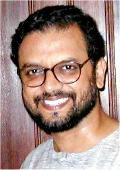The Independent Newsweekly
| National
Catholic Reporter
The Independent Newsweekly |
| Global Perspective |
| October 6, 2004 |
Vol.
2, No. 23
|

Fr. Francis Gonsalves is a Jesuit in the Gujarat Province, India. He lectures in systematic theology at Vidyajyoti College of Theology, Delhi, and has published many articles on theology, spirituality and social justice. |
The price of defending democracyBy Francis Gonsalves, S.J. MUMBAI, India -- Defending democracy is an arduous enterprise in India, the world's largest democracy. Last May, a secular, democratic coalition, the United Progressive Alliance -- mainly comprising Congress and leftist parties -- was elected to Parliament, replacing the National Democratic Alliance led by the Bharatiya Janata Party, a political party of the Hindu Right. During the latter's rule, fundamentalist forces posed grave threats to India's secular, democratic traditions. Yet, democracy triumphed, thanks to extraordinary efforts of ordinary citizens and peoples' groups who dourly defended it. The Mumbai-based Coalition for Secular Democracy is one such platform of peoples' groups daringly defending democracy.
Training trainers
Social activist Shweta Tambe is confident that the training program will achieve its objectives. "We get a deeper understanding about the complex issues involved in communalism from experienced personnel whose diversity in approaches and activities makes for effective training," Tambe said. The training program is expected to have a snowball effect in sensitizing sections of society that are prone to manipulation by fundamentalists. Awareness Campaigns
Organizing Protests
Recently, the Coalition for Secular Democracy organized a Demonstration for Democracy simultaneously in seven major Indian cities -- Ahmedabad, Bangalore, Chennai, Delhi, Hyderabad, Mumbai, and Ranchi -- to protest against draconian legislation proposed by the National Democratic Alliance. The Prevention of Terrorism Act is being employed arbitrarily to arrest "suspected terrorists" who, in most cases, belong to the minority Muslim community. Special Networking
To achieve this, the Coalition for Secular Democracy is printing and distributing thousands of pamphlets and posters that will warn voters of the hideous and hidden agenda of communal parties. Moreover, street plays, essay competitions, TV debates, music programs, CDs, video, and film screenings will mobilize the masses state wide. Such electoral emergencies depend on the time, talents, and energies of thousands of ordinary citizens. Wedding the secular and the sacred
A Mumbai-based religious sister who wishes to remain anonymous confessed, "I collaborate with [coalition] programs since I feel that the church does not involve itself sufficiently in civil society swamped by inequality, exploitation and violence." Being a 2.5% minority, the Indian church is often wary of getting involved in anything remotely "political." Yet, in India, where dharma (religion) plays a prominent role in public life, the church can ill afford to remain a silent spectator. In Pune city, I met nonagenarian Jesuit Joseph Neuner, a theologian and peritus at Vatican Council II. "Decades ago, the Vatican Council stressed that the church must serve the world," he said. "But we have forgotten our responsibility toward society!" Groups like the Coalition for Secular Democracy challenge the Indian church to serve society in the so-called "secular sphere" or else see the sacredness of democracy shattered by its own sanctimonious silence. * On Dec. 6, 1992, Hindu nationalists, working with leaders of the the Bharatiya Janata party, led a cadre of about 100,000 Hindu fanatics and destroyed Babar's Mosque in the small town of Ayodhya. At the same time, armed Hindu groups launched anti-Muslim riots in about a dozen of India's largest cities. ** In 2002, months of violence and killing between Hindu and Muslim Indians in Gujarat, was sparked off by the torching of a train traveling towards Ayodhya. |
|||||||||
| Copyright
© 2003 The National Catholic Reporter Publishing Company, 115
E. Armour Blvd., Kansas City, MO 64111
TEL: 1-816-531-0538 FAX: 1-816-968-2280 |